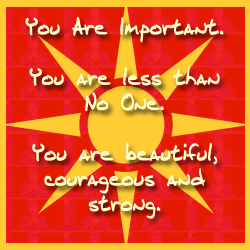Abuse Victims: You Are Beautiful, Strong and Courageous

In the following video, I say to you what I needed to remember today. I am less than no one. I have value. I am chock full of potential and promise. So are you.
To help me remember I am worthy, I have to remember the vocabulary of abuse. The vocabulary of abuse is the words and techniques abusers use to keep abuse victims as victims. When I was an abuse victim, I found myself confused: I knew something was wrong, but I couldn't decipher or describe what that something could be (Gaslighting: Designed to Destroy Your Sanity). Before I knew there was a vocabulary of abuse, I was destined to remain an abuse victim .
Abuse Victims, You Need To Hear This
Abuse Victims Should Learn The Vocabulary of Abuse
If you do not know the vocabulary of abuse, you are likely to spin your wheels trying to fix yourself when you are not the problem .
The abuser wants you to believe that the relationship problems come about because you are too selfish or too ignorant (or too something). You could fix the problem of being too selfish by consciously becoming unselfish. You could fix the problem of being too ignorant by educating yourself. Alas, there is no way for you to fix the problem when the thing that is wrong is your partner’s abusive behavior.
 It is almost impossible to define what's happening to you as abuse until you understand what words like undermining and diverting mean in relation to abusive relationships. Likewise, it is impossible to seek the proper help if you cannot define and describe the words and actions your partner uses to abuse you. The vocabulary of abuse clarifies your experience and allows you to understand the potential spiritual and physical deadliness of your partner’s behavior.
It is almost impossible to define what's happening to you as abuse until you understand what words like undermining and diverting mean in relation to abusive relationships. Likewise, it is impossible to seek the proper help if you cannot define and describe the words and actions your partner uses to abuse you. The vocabulary of abuse clarifies your experience and allows you to understand the potential spiritual and physical deadliness of your partner’s behavior.
As you know, not every bad feeling in a relationship stems from abuse. For example, we can feel remorse, heartache and distrust in our relationships for reasons other than abuse by our partners. No relationship, even the healthy ones, finds itself exempt from occasional pain. However, if you know the vocabulary of abuse you can also tell the difference between temporary, heal-able pain and permanent, unchanging abuse.
Pages That Help Abuse Victims Learn The Vocabulary of Abuse
- Definition of Abuse: Emotional, Verbal and Psychological Abuse
- Psychological Abuse: Definition, Signs and Symptoms
- What is Verbal Abuse?
- What is Domestic Violence and Abuse?
- What is Physical Abuse?
Abuse Victims: Vocabulary of Abuse Makes You Feel Like Nothing - Video Transcript
You are beautiful. You are strong. You are courageous. Everything in you that tells you otherwise is wrong. That’s all there is to it. Nobody is on this earth to feel less than human.
If you are feeling less than anything or anyone . . . then I can say that I’ve been there. I know what it feels like. I never want to go back. And I don’t want you to stay there one more minute.
If you feel less than someone you love, then you may be in an abusive relationship. You don’t need to leave right now, and you don’t need to say anything right now. But if you feel less than beautiful, less than courageous, less than strong, then I encourage you to examine your relationships to learn the vocabulary of abuse. Then you can decide if abuse is what causes you to feel less than.
I’m happy to say, for me, abuse does not cause me to feel less than anymore. I want the same for you. So get to a healthy place. Go to HealthyPlace, read the abuse information articles, read the mental health blogs, participate in the Facebook discussions and if you feel less than anyone, or anything, then realize that you don’t need to feel that way anymore.
I’d give you a big hug right now if I could.
You can find Kellie Jo Holly on her website, Google+, Facebook and Twitter.
*Both women and men could be abusers or victims, so do not take my pronoun choices as an implication that one gender abuses and the other is victimized.
APA Reference
Jo, K.
(2014, November 3). Abuse Victims: You Are Beautiful, Strong and Courageous, HealthyPlace. Retrieved
on 2026, March 3 from https://www.healthyplace.com/blogs/verbalabuseinrelationships/2014/11/less-than-no-one-and-the-vocabulary-of-abuse-video
Author: Kellie Jo Holly
Read: Patricia Evans, "The Verbally Abusive Relationship". Wake up, you're not doing yourself or your children any favors. Get out, you're worth it!! You matter!!
I was born into a life of abuse. It's generational, for my family. But that's something I didn't realize until recently, when looking at family stories and histories with new eyes and recognized the patterns of abuse.
The abuse comes in different ways, but each relationship is characterized by it - for some, it is substance or alcohol abuse, for others it is a violent temper and violence, while for others it is the use of limits on the power of one person to keep them trapped, and yet others use guilt of what leaving will do to other family members who are left behind to keep the relationship intact.
My mother is a narcissistic, controlling, and very spoiled woman. Growing up, we all feared my father's violent outbursts and temper, but we were far more likely to be beaten by our out-of-control screaming mother. Neither parent was a paragon of self-control. Us kids became very close, protecting each other, banding together out of fear of one or the other parent. To cope, we each took up our own sins to enable avoidance of home. My sin was being a workaholic. We were poor, so whatever money I was able to earn gained me a modicum of respect in a home were little else beyond money and church were respected.
I didn't recognize that my family was unhealthy, and so went out into the world after high school graduation with a very faulty set of life and relationship skills. I had no other model to go by.
My first marriage lasted 7 years. It was never good. My spouse had visions of being the next Einstein or Stephen Hawkins and pursued his studies with a manic and self-important fervor. I loved and believed in him, and accepted his barbed criticisms and insults to my intelligence and reasoning skills and anything else he chose to insult with the belief that he must be right - he was something special. As his self-delusion began to crack and he discovered course material that was hard enough that he had to struggle to understand it, his drinking became problematic. When I found out I was pregnant, he stopped working toward a degree altogether, blaming me for ruining his life and great career and stole money from my tips to buy himself beer and cigarettes to sit at home all day, playing video games in a filthy house while I worked multiple jobs to support us. When our son came, he used that as further reason for his non-functionality, blaming our child and my inadequacy as anything resembling a mother for his need to stay home and do nothing. The negativity and verbal abuse that I'd endured, and even supported veered into the physical realm, and I began to fear for my child's life and well-being.
I left with little more than my child, his diaper bag, and the clothes on our backs.
I had no place to go but my parents' home, where I was treated as an irresponsible child (while still working 2-3 jobs and taking classes at a local college), and my son was emotionally taken from me by my mother, who felt I was not adult enough to care for such a sweet, helpless angel. I was 29, and believed what I was told. I had no one else to tell me otherwise.
I graduated, finally, with my BS. Took a nice job for a small company near home. Met someone who made me feel like a million bucks. He loved my son. Got along very well with my parents. We moved in together, got married a couple of years later. His alcoholism got increasingly bad over time. The honeymoon was completely over a month or so after I gave birth to our son. He transferred any emotional attachment he had for me and my first child to our son, leaving my eldest bereft of fatherly love, leaving me isolated and alone. I became depressed. Stayed home after maternity leave because I didn't make enough money to pay for two kids in daycare, so became a stay-at-home mother. Became more isolated, unloved, uncared for. Tried hard to do everything my husband wanted me to do, but my efforts were never good enough. He was always snarky, drunk on weekends, and anything said in love during the weeks turned into criticism and disgust under the influence of alcohol on the weekends.
I went back to work when my second son was old enough for school. Took a lower-level job because as a mother, no one wanted to hire me for what I knew I could do. Started taking graduate courses. Figured that would fix the 'mommy track' I seemed to have been shifted to. After a few years, the graduate school informed me that I couldn't take any more credits unless I enrolled in a full-time program. Discussed options with my husband. He agreed that it was a good choice, for me get my PhD, that I could then get a really good job and he wouldn't have to work any more. I tried to explain that wasn't likely to be the way it would work, that there were many other steps in my field before something that good would come along, but he had his mind set and wouldn't listen to my explanations. I enrolled anyway.
Long, arduous years followed. Lot of hard work. Spouse even more critical, derogatory toward my efforts at home, belittling of my research. Never once came to my lab or to hear me talk. Ears closed and eyes rolled if I tried to explain what I did. He didn't care. Only positive in my life is my children, and with the hours devoted to my research, he was undermining my connection with them. Teaching them to treat me the way he does.
Depression took over again. Almost gave up on everything. Wanted to die. He refused to let me take Ivy-League post doctoral positions I was offered because we'd have to move. But that is what I had explained to him in the beginning, before I started on this path. That we'd need to do this before I could have a real job. Three times, I was offered and had to turn down high-level post-doctoral positions. Realized that my career was over if I didn't take one of them. Depression, suicidal thoughts resurfaced.
Now, I have a PhD, but no way to use it. Spouse has offered to let me take a position out of the area, if I will sign divorce papers. I won't leave my children behind with an abusive alcoholic, so I stay. I've applied to 100's of jobs. Without post-doc, no one will hire me for the kind of jobs I am good at, and with the PhD, no one will hire me for lower-level jobs that might pay the bills.
My last paycheck will come next week. I've never been unemployed in my entire life, since I was 12. Depression is taking over again.
Gods help me, I want to die. But that would be too easy. My children still need me.
Doesn't make living any easier.
I don't know what to do.
Thanks for your wonderful site!
I've been married 32 years to an abuser.
He changed dramatically after the birth of our 1st child (after we had
been married for 8 years!). His verbal abuse emerged.
He had me convinced everything was my fault for a long long time. A voice told me
he was wrong but it was hard to fight the constant put downs.
I lived a miserable lonely existence. Living with someone who cares
only for themselves is hard. I ate to cope. And everyone else's needs came before mine.
It took me bugging his computer --seeing he was playing
his plaything the same way I had been played. Suddenly, it made sense! I think
it shocked him that I had enough nerve to do that to him. Years later, he's still freaked
by it.
I haven't left him but I can
see with clearer eyes what BS he has spewed
all along. I no longer agree with his opinion of me.
And I find that I don't feel as angry, vindictive or my thoughts all encompassed
by his words or actions. Letting go of all of that is the best revenge.
Thinking my own thoughts for myself is something I'm relearning.
My only hope is that someone reading this does not repeat my mistake &
stubbornly stay...Get out when your voice disagrees with his opinion of you.
It won't get better & they take so much of you & you can waste your valuable time if you stay.
